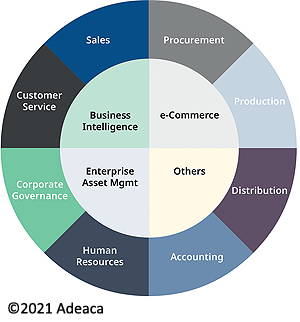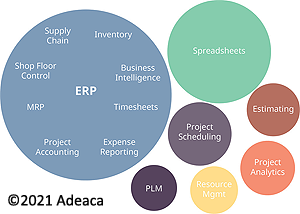Seamless connections
PBA (Project Business Automation) was created as a new technology category to specifically help project-based manufacturers achieve best practices. Bringing all the project functionalities along with the manufacturing functionalities into one system creates a seamlessly connected operation, precisely what Industry 4.0 is meant to accomplish.
PBA ensures that many manual processes are automated. Data exchanges between operations and finance are instant, ensuring the financial status of projects are known 24/7. Visibility into the whole project manufacturing processes is transparent and real time. If materials are delayed for a production order, that is instantly flagged on the project as a constraint and can be dealt with quickly by adjusting the timeline or sourcing materials elsewhere.
dealt with quickly by adjusting the timeline or sourcing materials elsewhere.
Di Liello: Do large manufacturers relate to project-based nomenclature?
Mong: Many companies fail to see themselves as first and foremost a project business. They think manufacturing or engineering first when they should think projects first. Projects must be the core of business. It is like the Pareto rule, 80 percent of business is project-based, yet sadly too many large manufacturers keep buying systems to satisfy the 20 percent Whether labelled Industry 4.0, IIoT, or lean manufacturing, the right systems and processes are essential. PBA was expressly developed to fit this complex paradigm Di Liello: Integrated data that is immediately accessible is the powerhouse of any business and provides the basis for businesses to make more accurate, effective and timely decisions. Business opportunities are missed as data often take months to aggregate and vet to ensure consistency and accuracy. As a result, poor decisions are made based on outdated data. The result are business deals with subpar margins.
Industry 4.0 data was designed to ensure that large project-based manufacturers avoid projects with little room for high margins from current customers. Without these data insights, margins erode and customized projects bid with significant margins evaporate.
Di Liello: How does PBA work from a lean manufacturing perspective?
Mong: For project manufacturers, PBA is all about lean. Lean is all about the reduction of waste. Project companies are plagued with massive waste in the form of inefficiencies due to disjointed and misaligned processes, lack of visibility and lack of accountability. This waste leads to inflated costs that take the form of budget buffers and large amounts of float/slack in projects.
Inefficiency and waste in project-based large manufacturing companies stems from operating in a siloed architecture. The departmental separation segregates different functions inside the enterprise behaving like different companies. These organizational silos are enabled by system silos (such as different systems for ERP, project management and project accounting).
PBA efficacy facilitates the lean transformation of project businesses. It breaks down the silos, brings everything together in one system, and creates a new structure for breakthrough productivity.
Di Liello: How does PBA interface with IIoT?
Mong: IIoT as an extension the project-driven hub that is uniquely charted with PBA. It connects the back-end systems with the ‘edge,’ which could be anything from production floor machinery to drones measuring installation progress on site. These devices need to feed these data somewhere. In a project-driven organization, it should go back into the project plan. When a piece of shop floor equipment is IIoT equipped it feeds data about its capacity back into the ERP production module.
Di Liello: Continuous improvement and lean manufacturing are iterative. To gain maximum effect all cross functional departments must be included and engaged in process improvements that are interdependant. For a manufacturing process to realize improvement it must be reflected in the ERP system to gain full value. When the process is optimized, new real-time data ensure utilization of Industry 4.0 and IIoT accuracy.

Lydia Di Liello, (pictured above), is CEO and founder of Capital Pricing Consultants, a revenue management and business consultancy. Di Liello brings more than 25 years of global revenue management and pricing expertise. She is a member of the Professional Pricing Society Board of Advisors and holds an MBA from Youngstown State University. She is a two-time recipient of the Supply & Demand Chain Executive Pros to Know.
http://capitalpricingconsultants.com/

Matt Mong (pictured above) is the Vice President for Marketing and Communications at Adeaca. The new technology category of Project Business Automation (PBA) is designed for large manufacturers focused on project-based operations.
https://www.adeaca.com/